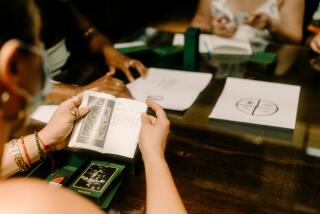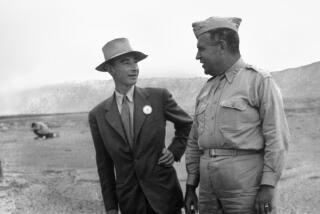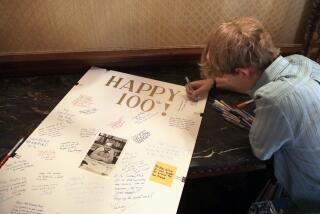Alda Takes On an Ancient Role in Popularizing Science
- Share via
Alan Alda is a lot like Lucretius.
To be fair, Alda, who is currently playing the late physicist Richard Feynman at the Mark Taper Forum, is a lot younger than the ancient Roman sage.
Lucretius lived more than 2,000 years ago, and wrote a famous poem that proffers everything from advice for the lovesick to a theory of the universe. His work, “On the Nature of Things,” translated mostly obscure Greek thought for a popular Latin audience. Today, we might call him a popularizer of science.
Lucretius composed his work primarily because he was concerned about the misery that ignorance and superstition bring upon the world. In the opening of his poem, he tells the story of a young girl “struck dumb with terror” and “led trembling to the altar” as she prepares to “fall a sinless victim to a sinful rite, slaughtered to her greater grief by a father’s hand, so that a fleet might sail under happy auspices.”
Such, concludes Lucretius, “are the heights of wickedness to which men have been driven by superstition.”
Alda isn’t necessarily worried about ritual human sacrifice, but he is concerned that many people lack the kind of knowledge of the natural world that nurtures rational thinking.
That’s one reason he was attracted to the character of the late Caltech physicist Richard Feynman, whom he now portrays to sold-out crowds. Feynman didn’t think you could fool Mother Nature, and he had no patience for people who tried. In fact, he once defined science as “a long history of learning how not to fool ourselves.”
“I was completely taken by the Feynman character, and I was especially taken by his courage,” Alda said. “He doesn’t want to fool you, and he doesn’t let himself be fooled.”
Alda came to his passion for science the hard way. From the age of 6, he was doing experiments, mixing toothpaste and baking powder to see what would happen. “Thank God I was too short to reach things that might really explode!”
At the age of 10, he dreamed up a malted milk machine, a six-armed can opener and a Lazy Susan designed for the inside of a refrigerator.
Later, however, he went through a period when he “thoroughly avoided” science, he said--in part because “the idea was in the air that if you’re interested in art, you can’t be interested in science.”
For a while during his 20s, he even got seriously into the study of clairvoyance and channeling. When the claims didn’t hold up, however, he went back to science, this time in earnest, reading Scientific American regularly, as well as whatever books he could find.
And then, he said, a funny thing happened: “I noticed my thinking started to change. I got a different idea of how you evaluate what’s true.”
He’s been stuck on science ever since, creating 10 hourlong programs a year for Scientific American Frontiers. Now, through May 13, he is channeling the spirit of Feynman onto the stage at the Taper.
Alda was attracted to Feynman’s insatiable curiosity and bottomless lust for life. “He was so curious about everything; he really believed that everything was interesting if you looked at it closely.”
Alda is not above throwing around his silverware and sugar packets during lunch to experiment with gravity, as he did recently at a Westwood restaurant with a certain science writer who prefers to remain anonymous.
“But we also have this very serious task of promoting understanding,” he said. “How do you figure out what to believe?”
Many people in our society lack the tools they need to tell the difference between established knowledge and the gossip they hear in their local health food store. Discerning the truth doesn’t require that we all become scientists, Alda said. But it does require that we base our beliefs about the world on investigation rather than faith. To drive his car, Alda said, he doesn’t need to know every detail of how it works. “But I like to know where the battery is.”
And learning how not to be fooled, he said, takes more than making scientific knowledge accessible. “The tools have to be made accessible,” he said. “Otherwise, you have to take things on faith.”
Specifically, he wished he’d learned more math. There’s still time, the anonymous writer points out. Alda is excited because a friend at Cornell has promised to teach him some “real” math. “Maybe I could learn to do an equation!” he says.
Lucretius would have approved.
“This dread and darkness of the mind cannot be dispelled by the sunbeams,” Alda’s predecessor wrote, “but only by an understanding of the . . . inner workings of nature.”
*
Cole can be reached at kc.cole@latimes.com.






